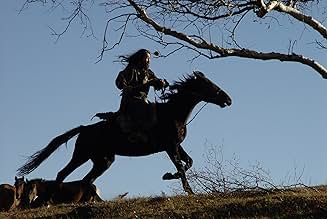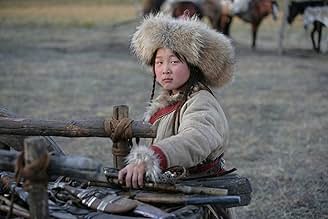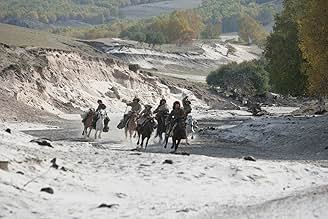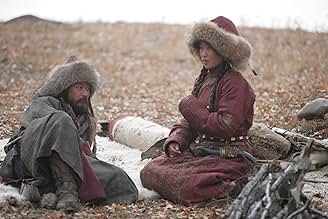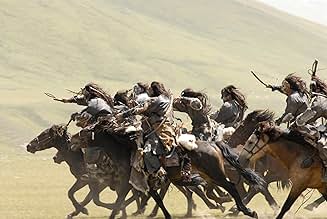CALIFICACIÓN DE IMDb
7.2/10
51 k
TU CALIFICACIÓN
La historia relata los primeros años de vida de Genghis Khan, que fue esclavo antes de conquistar medio mundo en 1206.La historia relata los primeros años de vida de Genghis Khan, que fue esclavo antes de conquistar medio mundo en 1206.La historia relata los primeros años de vida de Genghis Khan, que fue esclavo antes de conquistar medio mundo en 1206.
- Dirección
- Guionistas
- Elenco
- Nominado a 1 premio Óscar
- 16 premios ganados y 13 nominaciones en total
Liya Ai
- Oelun - Temudjin's Mother
- (as Aliya)
Baasanjav Mijid
- Esugei - Temudjin's Father
- (as Ba Sen)
Ayuur
- Sorgan-Shira
- (as A You Er)
Huntun Batu
- Altan
- (as Hong Jong Ba Tu)
Deng Ba Te Er
- Daritai
- (as E Er Deng Ba Te Er)
Su Ya La Su Rong
- Girkhai
- (as Su You Le Si Ren)
- Dirección
- Guionistas
- Todo el elenco y el equipo
- Producción, taquilla y más en IMDbPro
Opiniones destacadas
To the above two comments.
You know how they say history was written by the victors? That's true for everyone but the Mongols. Most of their history was written by the Chinese, Russians, Arabs, and other conquered peoples who had an interest in perpetuating Genghis Khan = bloodthirsty savage.
The movie is based on one of the few sources about Genghis khan written in Mongolian. It's called the secret history of the Mongols and was written shortly after he died as a record for the Mongolian royal family. He was just a chieftain's's son of a very minor tribe. That's what makes this story so impressive, he didn't start out as a king or a prince with a huge army, like Alexander. Everything he had, he had to earn. He didn't get to be Genghis Khan until he was in his 30's. He was always aware of how victory wasn't assured but had to be paid for with planning and strategy. He wasn't a saint by any means but he wasn't an unthinking savage. This movie is actually meant to be the first in a trilogy with the second one probably detailing his conquest of north china and the third the conquest of the Khwarezim empire in Iran and Afghanistan.
This is an approach that I like because the Alexander movie died on account of it trying to condense all of his conquests into one movie.
You know how they say history was written by the victors? That's true for everyone but the Mongols. Most of their history was written by the Chinese, Russians, Arabs, and other conquered peoples who had an interest in perpetuating Genghis Khan = bloodthirsty savage.
The movie is based on one of the few sources about Genghis khan written in Mongolian. It's called the secret history of the Mongols and was written shortly after he died as a record for the Mongolian royal family. He was just a chieftain's's son of a very minor tribe. That's what makes this story so impressive, he didn't start out as a king or a prince with a huge army, like Alexander. Everything he had, he had to earn. He didn't get to be Genghis Khan until he was in his 30's. He was always aware of how victory wasn't assured but had to be paid for with planning and strategy. He wasn't a saint by any means but he wasn't an unthinking savage. This movie is actually meant to be the first in a trilogy with the second one probably detailing his conquest of north china and the third the conquest of the Khwarezim empire in Iran and Afghanistan.
This is an approach that I like because the Alexander movie died on account of it trying to condense all of his conquests into one movie.
This film is an example of an extremely strong narrative accompanied by excellent cinematography and superbly executed war scenes... reminds me of Saving Pvt Ryan without all the bangs and clatter. The acting is also commendable. There seems to be a great deal of research that has gone into the subject and is a great eduction on the early life of Chengiz Khan. I wish there was more, but for the integrity of the subject I think the makers have done justice to the story. Would really appreciate if this made into a trilogy, but I don't think the film makers have left any scope to stretch it further. They have compressed a epic life tale into a little more than an hour and a half and with great flair and ease which is calls for a standing ovation. Lesson to Indian Film makers!!!
Mongol (2007), was co-written and directed by Sergei Bodrov. It was filmed in Kazakhstan, and is in Mongolian with English subtitles. It's a biography of Ghenghis Khan, especially his rise to power. The movie quotes an old proverb: "Do not scorn a weak cub; he may become a brutal tiger." Actually, as portrayed in the film, Ghenghis Khan was hardly a weak cub, even as a young child. However, he certainly became a tiger when grown--whether brutal or just powerful is another question.
The film is more or less consistent with the Wikipedia report of Khan's life. He was captured and enslaved as a boy, but managed to escape and eventually conquer his local tribal enemies. (The movie portrays Ghenghis Khan as a young boy and then a young man. The film ends before we can see Khan's eventual consolidation of his huge empire.)
There is (literally) a cast of thousands. The movie is colorful, the battle scenes are graphic, and men, women, and horses all look great. The acting was excellent, especially that of Odnyam Odsuren as the young Ghenghis Khan, Tadanobu Asano as the grown man, and the beautiful Khulan Chuluun as Börte, his wife.
For political and/or esthetic reasons, Khan is portrayed as a man who brought the warring Mongolian tribes together, and as a lawgiver and just ruler. I don't have enough knowledge of the period to know whether the people of his empire would have taken this view. However, this is a movie, not a Ph.D. dissertation, so I accepted it as an action-filled and enjoyable--if not profound--film.
We saw this film at the excellent Rochester High Falls International Film Festival. Because of the sweeping nature of the battles, and the glorious shots of the landscape, this movie will lose a lot on DVD. Try to see it in a theater, preferably one with a large screen.
The film is more or less consistent with the Wikipedia report of Khan's life. He was captured and enslaved as a boy, but managed to escape and eventually conquer his local tribal enemies. (The movie portrays Ghenghis Khan as a young boy and then a young man. The film ends before we can see Khan's eventual consolidation of his huge empire.)
There is (literally) a cast of thousands. The movie is colorful, the battle scenes are graphic, and men, women, and horses all look great. The acting was excellent, especially that of Odnyam Odsuren as the young Ghenghis Khan, Tadanobu Asano as the grown man, and the beautiful Khulan Chuluun as Börte, his wife.
For political and/or esthetic reasons, Khan is portrayed as a man who brought the warring Mongolian tribes together, and as a lawgiver and just ruler. I don't have enough knowledge of the period to know whether the people of his empire would have taken this view. However, this is a movie, not a Ph.D. dissertation, so I accepted it as an action-filled and enjoyable--if not profound--film.
We saw this film at the excellent Rochester High Falls International Film Festival. Because of the sweeping nature of the battles, and the glorious shots of the landscape, this movie will lose a lot on DVD. Try to see it in a theater, preferably one with a large screen.
The first installment of a prospective trilogy, Mongol chronicles the early life of Temudjin, from his childhood on the Asian steppe to his ascension to Khan in 1206.
The performances are passable with special thanks to Honglei Sun, with an engaging turn as Temudjin's long-time friend and ally Jamukha but the film has a rushed quality to it that is predominantly the fault of the screenplay. We jump too quickly from one scene to the next, the tension is constantly disrupted, and the characters are, for the most part, one-dimensional, void of quirks and personal histories and any of the other qualities that might make them relatable. I'm not asking for anything fancy: theirs was a tribal culture constantly engaged in the act of survival, and any philosophical rants or emotive confessionals would feel forced and inorganic, but none of that pardons the film for the simple crime of not giving its characters enough to do. The needs of the plot seem to dictate their actions, rather than the needs of the characters driving the plot.
The biggest casualty, as always, is the love story. Ironically enough, Temudjin and Borte generate the most chemistry when they meet as children, Borte commanding him with a freeness of spirit that gets less and less visible as the movie progresses to pick her as his bride. Unfortunately, their subsequent romance is more about desperate rescues and long-winded goodbyes than it is the simple moments of intimacy that make a relationship believable.
That said, the cinematography is tremendous and the costumes top-notch, and the casting department deserves a couple extra bushels of brownie points for picking actors who unlike many a Hollywood ensemble look like they could actually survive the conditions they supposedly inhabit. The combat scenes are captivating and cleverly shot, and despite the inevitable comparison to such battle-heavy epics as Lord of the Rings and Gladiator, Bodrov keeps a handle on things, never letting any of the battles run beyond the five minute mark, endowing the film with an element of realism and restraint where many of the other so-called epics go completely over the top. True, the movie relies a bit more heavily on CGI than I would prefer, but the Mongolian landscape, the real star of the show, is so gorgeous, so demanding, so jaw-droppingly authentic that we quickly forget our visual grievances and get lost in the rudimentary act of watching.
A pity we can never lose ourselves completely.
The performances are passable with special thanks to Honglei Sun, with an engaging turn as Temudjin's long-time friend and ally Jamukha but the film has a rushed quality to it that is predominantly the fault of the screenplay. We jump too quickly from one scene to the next, the tension is constantly disrupted, and the characters are, for the most part, one-dimensional, void of quirks and personal histories and any of the other qualities that might make them relatable. I'm not asking for anything fancy: theirs was a tribal culture constantly engaged in the act of survival, and any philosophical rants or emotive confessionals would feel forced and inorganic, but none of that pardons the film for the simple crime of not giving its characters enough to do. The needs of the plot seem to dictate their actions, rather than the needs of the characters driving the plot.
The biggest casualty, as always, is the love story. Ironically enough, Temudjin and Borte generate the most chemistry when they meet as children, Borte commanding him with a freeness of spirit that gets less and less visible as the movie progresses to pick her as his bride. Unfortunately, their subsequent romance is more about desperate rescues and long-winded goodbyes than it is the simple moments of intimacy that make a relationship believable.
That said, the cinematography is tremendous and the costumes top-notch, and the casting department deserves a couple extra bushels of brownie points for picking actors who unlike many a Hollywood ensemble look like they could actually survive the conditions they supposedly inhabit. The combat scenes are captivating and cleverly shot, and despite the inevitable comparison to such battle-heavy epics as Lord of the Rings and Gladiator, Bodrov keeps a handle on things, never letting any of the battles run beyond the five minute mark, endowing the film with an element of realism and restraint where many of the other so-called epics go completely over the top. True, the movie relies a bit more heavily on CGI than I would prefer, but the Mongolian landscape, the real star of the show, is so gorgeous, so demanding, so jaw-droppingly authentic that we quickly forget our visual grievances and get lost in the rudimentary act of watching.
A pity we can never lose ourselves completely.
The most pleasing part of this film, I thought, was the excellent cinematography. Kudos to Roger Stoffers and Sergei Trofimov for an outstanding job photographing this movie, making the most bleak of landscapes look stunning many times and adding some wonderful closeup shots of objects and faces.
It's not a bad story, either, although not one that will keep you riveted to the screen for the full two hours. However, I wasn't bored, either, although some of the action scenes looked too repetitive with very hokey-looking special-effects concerning blood splashing out of people in the battle scenes. It did not look real, but as if it were drawn. It's ironic in that the production values seem to be so high with a such a nicely-filmed effort, yet the action scenes are staged like a B-movie.
In a nutshell, this is the story of how "Genghis Kahn," who is "Temudjin" throughout the movie, spent his tough early life and how he became the famous warrior. We just see how many hardships the man endured to become who he was later in life. He was never referred to as Genghis Kahn which, I learned hear, is a title more than a name. That must have come later, after he had control of all the Mongol armies, which is where the film ends.
Many times, it's a not a pleasant existence for "Temudjin," who was marked man from the age of nine. We see him spend many lonely hours held captive in different places. The looks on his face are memorable. Odnyam Odsuren ad the young "Temudjin" and Tadanobu Asano as the adult "Temudjin" both had extraordinarily photographic faces.
One of the few problems I had with the movie were understanding "the rest of the story" as certain scenes ended abruptly leaving me (and I assume other viewers) wondering "what happened?" His friends, though, were fun to watch and his bride was a beautiful, kind and strong woman, as pictured in this movie. Actually, I found this just as much of a love story as a war epic, and the romance angle was far more dramatic. The devotion the lead male and female had to each other, and the faithfulness and loyalty were inspiring, to say the least.
It's not a bad story, either, although not one that will keep you riveted to the screen for the full two hours. However, I wasn't bored, either, although some of the action scenes looked too repetitive with very hokey-looking special-effects concerning blood splashing out of people in the battle scenes. It did not look real, but as if it were drawn. It's ironic in that the production values seem to be so high with a such a nicely-filmed effort, yet the action scenes are staged like a B-movie.
In a nutshell, this is the story of how "Genghis Kahn," who is "Temudjin" throughout the movie, spent his tough early life and how he became the famous warrior. We just see how many hardships the man endured to become who he was later in life. He was never referred to as Genghis Kahn which, I learned hear, is a title more than a name. That must have come later, after he had control of all the Mongol armies, which is where the film ends.
Many times, it's a not a pleasant existence for "Temudjin," who was marked man from the age of nine. We see him spend many lonely hours held captive in different places. The looks on his face are memorable. Odnyam Odsuren ad the young "Temudjin" and Tadanobu Asano as the adult "Temudjin" both had extraordinarily photographic faces.
One of the few problems I had with the movie were understanding "the rest of the story" as certain scenes ended abruptly leaving me (and I assume other viewers) wondering "what happened?" His friends, though, were fun to watch and his bride was a beautiful, kind and strong woman, as pictured in this movie. Actually, I found this just as much of a love story as a war epic, and the romance angle was far more dramatic. The devotion the lead male and female had to each other, and the faithfulness and loyalty were inspiring, to say the least.
¿Sabías que…?
- TriviaDirector Sergei Bodrov and Production Designer Dashi Namdakov visited Mongolia's chief shaman in the capital city of Ulan Bator, so that they could ask permission to film a movie about Genghis Khan's life. The shaman told them that of all the people who have talked about making such a film, they were the only ones to ask his permission.
- ErroresThe Mongolian tribes, including the hordes that conquered their vast empire, rode on a very peculiar race of horses, stocky build, with relatively short legs and a large head. The horses used in the movie look like ordinary western horses
- ConexionesFeatured in The 80th Annual Academy Awards (2008)
- Bandas sonorasBeginning
Composed By Tuomas Kantelinen
Performed by Hamburg Film Orchestra, The London Session Orchestra, One Orchestra, Altan Urag
© 2008 X-Filme Creative Pool GmbH.
(p) 2008 Kinofabrika GmbH & Tuomas Kantelinen Ensemble.
Selecciones populares
Inicia sesión para calificar y agrega a la lista de videos para obtener recomendaciones personalizadas
Detalles
- Fecha de lanzamiento
- Países de origen
- Idiomas
- También se conoce como
- Mongol: The Rise of Genghis Khan
- Locaciones de filmación
- Inner Mongolia, China(location)
- Productoras
- Ver más créditos de la compañía en IMDbPro
Taquilla
- Presupuesto
- USD 18,000,000 (estimado)
- Total en EE. UU. y Canadá
- USD 5,705,761
- Fin de semana de estreno en EE. UU. y Canadá
- USD 135,326
- 8 jun 2008
- Total a nivel mundial
- USD 26,527,510
- Tiempo de ejecución
- 2h 6min(126 min)
- Color
- Mezcla de sonido
- Relación de aspecto
- 2.35 : 1
Contribuir a esta página
Sugiere una edición o agrega el contenido que falta







